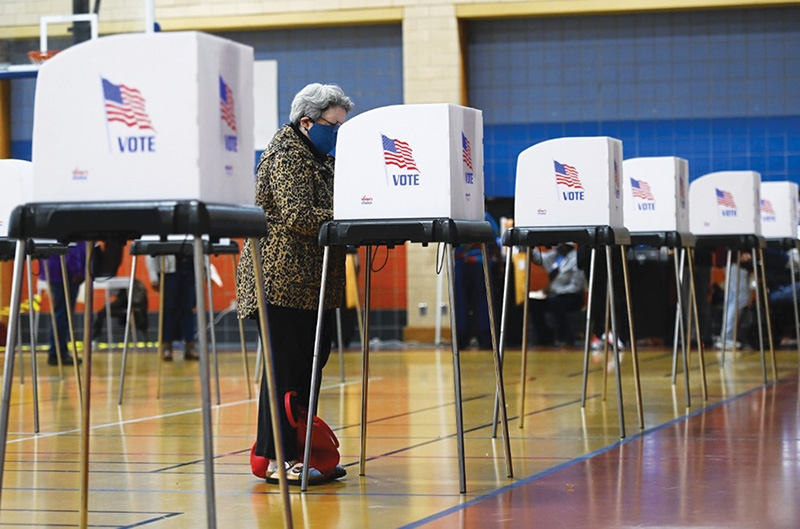Vietnam can win big regardless of result
 |
| Michael Kokalari, chief economist at VinaCapital |
US foreign policy towards Asia in general is not expected to change significantly next year, irrespective of who is ultimately declared the winner of the presidential election, but the geopolitical realities entailed with China’s rise necessitate a strong relationship between the United States and Vietnam.
A Trump re-election would mean “more of the same” for Vietnam. That includes a continuation of Trump’s tough China policy which has prompted companies to move their factories from China to Vietnam. Trump’s continued implementation of this policy would continue to occasionally prompt major sell-offs in emerging and frontier stock markets. We do not believe the Trump administration would actually enact any aggressive trade policies towards Vietnam.
Further to that, the Trump administration would probably continue to make occasional noises about Vietnam’s large trade surplus with the US. However, the status quo will almost certainly continue, which means no draconian tariffs on imports into the US.
Recently, some local analysts and economists were concerned about the launch of an investigation by the Trump administration into Vietnam’s trade practices and into the value of VND specifically. We believe this investigation is only likely to result in some symbolic actions that target specific industries, such as the recent threat to impose 6-10 per cent countervailing duties on Vietnam’s tyre exports to the US. Such symbolic actions will not have a major impact on Vietnam’s economy.
If Biden wins the election, he would probably need to continue being fairly tough on China for political reasons. Various recent surveys have found that 75 per cent of Americans have an unfavourable view of China. For that reason, it is likely that factories would continue to relocate from China to regional countries including Vietnam for years to come, although the urgency for businesses to relocate out would probably moderate somewhat.
That said, Biden’s personal style would probably be less openly antagonistic towards China, and he may be less focused on the trade deficits with China and Vietnam. This could mean that a Biden administration would probably roll back some - but not all - of Trump’s tariffs on imports from China. That would be positive for emerging and frontier stock markets, including Vietnam’s.
While Biden’s foreign policy stance towards China may be slightly less aggressive than that of Trump, his domestic policy agenda would probably be slightly better for Vietnam. This is because the democrats want more COVID-19 aid and a bigger fiscal stimulus package to support the US economy than the Republicans. This would lead to greater demand for products manufactured in Vietnam and exported to the US; and depreciation in the value of the dollar, which would benefit Vietnam’s stock and real estate markets.
 |
| More American citizens than ever before voted by mail prior to election day instead of heading to the polls, photo AFP |
Further to the point above, Vietnam’s exports to the US are on the rise, driven by demand of US consumers for “stay at home” products such as televisions and consumer electronics, but this demand was fuelled by an aggressive fiscal stimulus package that the US government launched in March to support the US economy in the wake of the pandemic.
The magnitude of the government’s stimulus package was so great (circa 10 per cent of GDP) that the personal incomes of people in the US actually surged at one of the fastest rates in history this year – despite the country suffering one of the worst economic collapses in history.
Consequently, the amount of money that US consumers have spent on products this year is about 6 per cent above pre-pandemic levels. The US government already finished disbursing all of the COVID-19 stimulus money in that $2.2 trillion aid package, and the democrats in Congress want a new aid package, which could be even bigger than the last one.
However, if Biden does get elected and the Congress manages to pass an even larger fiscal stimulus package, the value of the dollar could plunge. Some economists, including Stephen Roach at Yale – who was previously Morgan Stanley Asia’s chief economist – think that the value of the US dollar could fall by as much as 35 per cent next year. At this point, the republicans seem likely to retain control of the US Senate, which means that any aid package passed would be a product of compromise.
Emerging and frontier stock markets usually perform well when the value of the dollar falls. Furthermore, the State Bank of Vietnam would need to take certain actions to prevent the value of VND from significantly appreciating against the dollar to maintain Vietnam’s export competitiveness. When the Bank of Japan faced a similar situation in the late 1980s, its efforts to prevent the yen from appreciating prompted stock market and real estate bubbles. It’s unlikely that the same scenario would unfold in Vietnam, but a major decline in the value of the dollar could ultimately lead to fairly major stock and real estate bull markets in Vietnam.
| Adam Sitkoff - Executive director, American Chamber of Commerce in Hanoi
Although the vast majority of people across the planet don’t get a vote in the US election, we are all impacted by the outcome. The days-long drama is captivating a global audience as people anxiously watch to see how it plays out. The US vote-counting process might seem confusing but it is actually transparent, methodical, and very credible. Most importantly, it demonstrates that every vote counts. The election results show a continued urban-rural divide. This split underscores fundamental disagreements among Americans about many key issues such as controlling the coronavirus pandemic, revitalising the economy and restoring jobs, whether to do anything about climate change, how best to handle the relationship with China, and more. If we see a new president in Joe Biden, he will likely continue the close friendship between our two countries as he shares Vietnam’s desire for stability, progress, and prosperity in this region. AmCham would welcome the opportunity to work with him and his administration to increase trade and investment between the United States and Vietnam. |
Finally, Biden has publically stated in the past that he would want the US to think about rejoining the Trans-Pacific Partnership trade pact, now the Comprehensive and Progressive Agreement for Trans-Pacific Partnership, if he is elected. This attracted a reasonable amount of attention in the local Vietnamese business press because Vietnam has often been cited as the country that would benefit the most.
However, the agreement would need to be renegotiated in order for the US to rejoin because of a conflict within the democratic party between the “neo-liberal” faction, which includes Barack Obama and Bill Clinton who are in favour of the agreement; and the “progressive” faction of the party, which includes Bernie Sanders and Alexandria Ocasio-Cortez, who are against the deal in its current form.
As a result, renegotiation would be fraught with so many difficulties that it is unlikely the US would rejoin any time soon.
What the stars mean:
★ Poor ★ ★ Promising ★★★ Good ★★★★ Very good ★★★★★ Exceptional
Related Contents
Latest News
More News
- Foreign leaders extend congratulations to Party General Secretary To Lam (January 25, 2026 | 10:01)
- 14th National Party Congress wraps up with success (January 25, 2026 | 09:49)
- Congratulations from VFF Central Committee's int’l partners to 14th National Party Congress (January 25, 2026 | 09:46)
- 14th Party Central Committee unanimously elects To Lam as General Secretary (January 23, 2026 | 16:22)
- Worldwide congratulations underscore confidence in Vietnam’s 14th Party Congress (January 23, 2026 | 09:02)
- Political parties, organisations, int’l friends send congratulations to 14th National Party Congress (January 22, 2026 | 09:33)
- Press release on second working day of 14th National Party Congress (January 22, 2026 | 09:19)
- 14th National Party Congress: Japanese media highlight Vietnam’s growth targets (January 21, 2026 | 09:46)
- 14th National Party Congress: Driving force for Vietnam to continue renewal, innovation, breakthroughs (January 21, 2026 | 09:42)
- Vietnam remains spiritual support for progressive forces: Colombian party leader (January 21, 2026 | 08:00)


 Tag:
Tag:




















 Mobile Version
Mobile Version